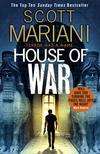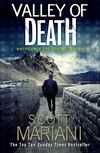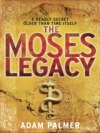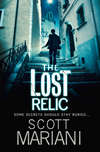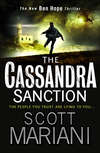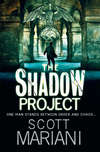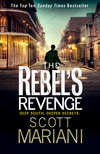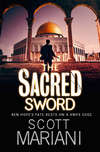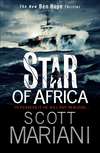Kitabı oku: «The Ben Hope Collection», sayfa 7
20
Ever since his impoverished childhood in rural Sardinia, Franco Bozza had enjoyed giving pain. His first victims had been insects and worms, and as a young boy he’d spent many contented hours developing increasingly elaborate ways of slowly dissecting them and watching them writhe and die. Before the age of eight, Franco had progressed to practising his skills on small birds and mammals. Some fledglings in a nest suffered first. Later, local dogs started to disappear. As Franco progressed through his teens he grew into a master torturer and an expert in inflicting agony. He loved it. It was the thing that made him feel most alive.
By the time he’d left school at the age of thirteen he’d become almost equally fascinated with Catholicism. He was entranced by the crueller images of Christian tradition–the crown of thorns, the bleeding stigmata of Christ, the way the nails had been hammered through the hands and feet into the cross. Franco polished the basic literacy skills he’d learned in school just so he could read about the deliciously gruesome history of the Church. One day he came across an old book that described the persecution of heretics by the medieval Inquisition. He read how, after the conquest of a Cathar stronghold in the year 1210, the commander of the Church forces had ordered that a hundred Cathar heretics have their ears, noses and lips cut off, their eyes gouged out, and be paraded before the ramparts of other heretic castles as an example. The boy was deeply inspired by such macabre genius, and he would lie awake at night wishing he could somehow have taken part in it.
Franco fell in love with religious art, and would walk miles to the nearest town to visit the library and drool over historic prints showing grisly images of religious oppression. His favourite painting was The Hay Wagon by Hieronymus Bosch in the 1480s, showing horrible tortures at the hands of demons, bodies pierced by spears and blades, and–most exciting of all–a nude woman. It wasn’t her nudity in itself that provoked such choking feelings of lust in him. Her arms were tied behind her back, and all that covered her nakedness was a black toad clapped to her genitals. She was a witch. She would be burnt. This was what generated such intense, almost frantic, excitement in him.
Franco learned about the historical backdrop to Bosch’s painting, the furious misogyny of the Catholic Church during the fifteenth century when Pope Innocent VIII had issued his Witch Bull, the document that gave the Vatican’s seal of approval to the torture and burning of women suspected, however vaguely, of being in league with the Devil. Franco went on from there to discover the book known as the Malleus Malificarum, the ‘Witches’ Hammer’, the official Inquisition manual of torture and sadism for those who served God by drenching themselves in heretic blood. It instilled in young Franco the same violent horror of female sexuality that had permeated medieval Christian faith. A woman who indulged in sex, who enjoyed it, didn’t just lie there, must be the Devil’s bride. Which meant she had to die. In a horrible way. That was the part he liked best.
Franco became an expert on the entire bloody past of the Catholic Inquisition and the Church that had spawned it. While others admired the beautiful artwork by Botticelli and Michelangelo in the Vatican’s Sistine Chapel for its own sake, Franco revelled in the fact that while these works of art were being commissioned by the Church, a quarter million women across Europe were being put to the stake with the Pope’s blessing. The more he learned, the more he came to appreciate that to subscribe to the Catholic faith and its legacy was, tacitly or otherwise, to espouse centuries of systematic and unrestrained mass murder, war, oppression, torture and corruption. He’d found his spiritual calling, and he rejoiced in it.
Eventually, in 1977, it came time for Franco to marry his intended, the daughter of the local gunsmith. He reluctantly agreed to the marriage to Maria, to please his parents.
On his wedding night, he discovered that he was completely impotent. At the time, this caused him no concern. He’d never cared that he was still a virgin, because he already knew that the only thing that could excite him was when he had his knife and could inflict pain. That was what drew him and made him feel powerful. Female flesh had no allure for him.
But as weeks turned into months and he continued to show no interest in her sexually, Maria started taunting him. One night she pushed him too far. ‘I’m going out to find a real man with balls,’ she screamed at him. ‘And then everyone will know that my husband is nothing but a useless castrato.’
Franco was already powerful and muscular at the age of twenty. Enraged, he grabbed her by the hair and dragged her up to the bedroom where he threw her brutally down on the bed, knocked her semiconscious and took a knife to her flesh.
That had been the night that Franco had made a life-changing discovery, that a woman’s body could excite him after all. He didn’t touch her–only the steel touched her. He left Maria tied to the bed, mutilated and permanently disfigured. He fled the village in the middle of the night. Maria’s father and brothers came after him, vowing revenge.
Franco had never ventured more than a few miles from his village before, and he was soon lost, penniless and hungry in the verdant Sardinian countryside. It was outside a bar near Cagliari, begging for food, that Maria’s elder brother Salvatore found him one night. Salvatore crept up on the unsuspecting Franco from behind and slashed his throat with his knife.
A weaker man would have collapsed and died, let himself be butchered. Franco was half starved and drenched in the blood that spurted from the gash in his neck. But the pain and the smell of the blood gave him new strength, raw energy. He stayed on his feet like a wounded animal. Instead of running, he attacked. If Salvatore had brought a gun that night, it would have been different. But Franco took the knife from him, overpowered him and cut his liver out. Slowly.
It was the first time he’d killed a man, but it wouldn’t be the last. He robbed Salvatore’s body of money, and fled to the coast where he took the ferry to the Italian mainland. His cut throat healed, but he would speak in a strangled whisper for the rest of his life.
With the ensuing vendetta against him, Franco Bozza was exiled from Sardinia. He travelled around southern Italy, bumming from job to job. But his lust for inflicting pain was never far away, and before the age of twenty-four his talents were being put to good use by Mafia hoods who employed him to press information out of their captured enemies. Franco Bozza was a natural, and his fearsome reputation soon spread through the criminal underworld as an exceptionally callous and cold-hearted torturer. When it came to prolonging life and maximizing agony, he was the undisputed maestro.
When Bozza–or the Inquisitor, as he now styled himself–wasn’t performing his art on some hapless criminal he’d stalk the streets at night and prey on prostitutes, luring them to their death with his whispering voice. Their pitiful remains began to appear in dingy hotel rooms all over southern Italy. Rumours spread of a ‘monster’, a maniac who feasted on pain and death the way a vampire feasted on blood. But the Inquisitor always covered his tracks. His police record was as virginal as his sexuality.
One day in 1997 Franco Bozza got an unexpected phone call–not from the usual underworld kingpin or Mafia boss, but from a Vatican bishop.
It was through the shadows of the underworld that Massimiliano Usberti had heard of this Inquisitor. The man’s notorious religious zeal, his absolute devotion to God and his unflinching will to punish the wicked, were just the qualities Usberti wanted for his new organization. When Bozza heard what his role was to be, he seized the opportunity right away. It was perfect for him.
The organization was called Gladius Domini. The Sword of God.
Franco Bozza had just become its blade.
21
Paris
‘Hello–put me through to Monsieur Loriot, please?’
‘He is away on business at the moment, sir,’ replied the secretary. ‘He won’t be back until December.’
‘But I got a call from him just yesterday.’
‘I’m afraid that isn’t possible,’ the secretary said testily. ‘He’s been in America for a month.’
‘Sorry to bother you,’ Ben said. ‘Obviously I’ve been misinformed. Could you tell me if Monsieur Loriot is still living at the Villa Margaux in Brignancourt?’
‘Brignancourt? No, Monsieur Loriot lives here in Paris. I think you must have the wrong number. Good day.’ The line went dead.
It was clear now. Loriot hadn’t called him at all-the train hit had been someone else’s idea. Just as he’d thought. It was too improbable.
He sat and smoked, thinking about it. The evidence pointed in a new direction. He’d called Loriot’s office from Roberta’s place. Michel Zardi had been in the room with him, listened in, taken his number. He’d gone straight out through the door soon afterwards–to buy fish for his cat. Yeah, and to pass the number on to his cronies, too. So they’d called him back pretending to be Loriot. It was a risk–what if the real Loriot had called back too? Maybe they’d checked first that he was out of town.
It wasn’t a perfect plan, but it had been good enough. Ben had let himself get picked up like an apple off a tree, and only Roberta’s chance intervention had saved him from being smeared over a hundred metres of railway line. Without her, they’d still be spooning him out of the cracks in the sleepers.
Was he slipping? This couldn’t happen again.
It also meant that the same people who were after Roberta Ryder were after him too. They meant business, and that, like it or not, drew Ben and her together.
He’d been awake since dawn and had been pondering all morning what to do with her. The day before, he’d been thinking that he’d have to ditch her, pay her off, force her to return to the States. But maybe he’d been wrong. She might be able to help him. She wanted to find out what was going on, and so did he. And he sensed that for the moment she wanted to stick by him, partly out of fear, partly out of fierce curiosity. But that wouldn’t last if he went on keeping her in the dark, freezing her out, not trusting her.
He sat on his bed and thought about it until he heard her moving about in the next room. He stood up and pushed open the door. She was stretching and yawning, the rumpled bedclothes heaped up on the floor at her feet. Her hair was tousled.
‘I’m making coffee, and then I’m getting out of here,’ he said. ‘The door’s open. You’re free to go.’
She looked at him, said nothing.
‘Time to decide,’ he said. ‘Are you staying or leaving?’
‘If I stay, I have to stay with you.’
He nodded. ‘We have a lot of figuring out to do. And we need to do this my way.’
Are we trusting one another now?’
‘I suppose we are,’ he said.
‘I’m staying.’
He walked along the row of used cars, casting his eye over each one in turn. Something quick and practical. Not too ostentatious, not too distinctive. ‘What about this one?’ he asked, pointing.
The mechanic wiped his hands on his overall, leaving parallel oil smears down the blue cloth. ‘She is one year old, perfect condition. How you paying?’
Ben patted his pocket. ‘Cash all right?’
Ten minutes later Ben was gunning the silver Peugeot 206 Sport along Avenue de Gravelle towards the main Paris ring-road.
‘Well, for a journalist you sure seem to throw a lot of money around, Ben,’ Roberta said next to him.
‘OK, time for the truth. I’m not a journalist,’ he confessed, slowing down for the heavy traffic on the approach to the Périphérique.
‘Ha. Knew it.’ She clapped her hands. ‘Am I allowed to know what you do do, Mr. Benedict Hope? That your real name, by the way?’
‘It’s my real name.’
‘It’s a nice name.’
‘Too nice for a guy like me?’
She smiled. ‘I didn’t say that.’ ‘As for what I do,’ he said, ‘I suppose you could say I’m a seeker.’ He filtered through the traffic, waited for a gap, and the acceleration of the sporty little car pressed them back in their seats as its fruity engine note rose to a pleasing pitch.
‘A seeker of what? Trouble?’
‘Well, yes, sometimes I’m a seeker of trouble,’ he said, allowing a dry smile. ‘But I wasn’t expecting as much trouble this time.’
‘So what are you seeking? And why come to me?’
‘You really want to know?’
‘I really want to know.’
‘I’m trying to find the alchemist Fulcanelli.’
She arched an eyebrow. ‘Riiight… Uh-huh. Go on.’
‘Well, what I’m really looking for is a manuscript he was supposed to have had, or written–I don’t know much about it.’
‘The Fulcanelli manuscript–that old myth.’
‘You’ve heard of it?’
‘Sure, I’ve heard of it. But you hear a lot of things in this business.’
‘You don’t think it exists.’
She shrugged. ‘Who knows? It’s like the holy grail of alchemy. Some say it does, some say it doesn’t, nobody knows what it is or what’s in it, or even if it really exists. What do you want with it, anyway? You don’t seem to me like the sort who goes for all this stuff.’
‘What sort’s that?’
She snorted. ‘You know what one of the biggest problems with alchemy is? The people who are drawn to it. I never met one yet who wasn’t some kind of fruitcake.’
‘That’s the first compliment you’ve paid me.’
‘Don’t take it to heart. Anyway, you didn’t answer the question.’
He paused. ‘It’s not for me. I’m working for a client.’
‘And this client believes the manuscript can help with some kind of illness, right? That’s why you were so interested in my research. You’re looking for some kind of medicinal cure for someone. The client’s sick?’
‘Let’s just say he’s pretty desperate for it.’
‘Boy, he must be.’
‘I was wondering if your fly elixir could be of any use to him.’
‘I’ve told you. It’s not ready yet. And I wouldn’t even try it on a human being. It would be totally unethical. Not to mention practising medicine without a licence. I’m in enough shit as it is, apparently.’
He shrugged.
‘So, Ben, are you going to tell me where we’re going in this fancy new toy of yours?’
‘Does the name Jacques Clément mean anything to you?’ he asked.
She nodded. ‘He was Fulcanelli’s apprentice back in the twenties.’ She shot him a questioning look. ‘Why?’
‘The story goes, Fulcanelli passed on certain documents to Clément before he disappeared,’ he filled in. She was waiting for more, so he went on. ‘Anyhow, that was back in 1926. Clément’s dead now, died a long time ago. But I want to know more about whatever it was that Fulcanelli gave him.’
‘How can you find out?’
‘One of the first things I did when I got to Paris three days ago was to check out any surviving family. I thought they might be able to help.’
‘And?’
‘I traced his son, André. Rich banker, retired. He wasn’t very forthcoming. As a matter of fact, as soon as I mentioned Fulcanelli he and his wife basically told me to piss off
‘That’s what happens when you mention alchemy to anyone,’ she said. ‘Join the club.’
‘Anyway, I didn’t think I’d hear from them again,’ he went on. ‘But this morning, while you were sleeping, I had a call.’
‘From them?’
‘From their son, Pierre. We had an interesting talk. It turns out there were two brothers, André and Gaston. André was the successful one, and Gaston was the black sheep of the family. Gaston wanted to carry on his father’s work, which André hated, saw it as witchcraft.’
‘That figures.’
And they basically disowned Gaston. Family embarrassment. They won’t have anything to do with him any longer.’
‘Gaston’s still alive?’
‘Apparently so. He lives a few kilometres away, on an old farm.’
She settled back in her seat. ‘And that’s where we’re headed?’
‘Don’t get too excited. He’s probably some kind of oddball…what did you call them?’
‘Fruitcakes. Technical term.’
‘I’ll make a note of it.’
‘So you think Gaston Clément might still have those papers, or whatever it was that Fulcanelli passed on to his father?’
‘It’s worth a try.’
Anyway, I’m sure this is all very interesting,’ she said. ‘But I thought we were trying to find out what the fuck’s going on and why someone’s trying to kill us?’
He shot her a glance. ‘I haven’t finished yet. There’s one other thing Pierre Clément told me this morning. I wasn’t the last person to make contact with his father asking questions about Fulcanelli. He said that three men turned up there a couple of days ago asking the same questions, and asking about me too. Somehow all this is connected–you, me, Michel, the people after us, and the manuscript.’
‘But how?’ She shook her head in confusion.
‘I don’t know how.’
The question was, he thought to himself, had the three men found out about Gaston Clément? He could be walking into another trap.
In another hour or so they’d reached the derelict farm where Pierre Clément had said his uncle lived. They pulled up in a wooded layby a few hundred metres up the road. ‘This is the place,’ Ben said, checking the rough map he’d written from the directions.
Grey clouds overhead were threatening rain as they walked towards the farm. Without letting her see, he quietly popped open the press-stud on his holster’s retaining strap and kept his hand hovering near his chest as they reached the cobbled yard. There were deserted, decaying farm buildings on both sides. A tall, dilapidated wooden barn sat behind a wrecked cowshed. Broken windows were nailed over with planks. A slow curl of smoke was rising from a blackened metal chimney.
Ben looked around him cautiously, ready for trouble. There was nobody else about.
The barn seemed empty. Inside, the air was thick and smoky and laden with an unpleasant reek of dirt and strange smouldering substances. The building was one big room, dimly lit by milky rays of sunlight that shone through the cracks in the planking and the few dusty window-panes. Twittering birds were flying in and out of a hole high up in the gable end. At one side of the barn a raised platform on rough wooden poles supported a ragged armchair, a table with an old TV and a bed heaped with dirty blankets. At the other side was a huge sooty furnace whose black iron door hung open a few inches, exuding a stream of dark smoke and a pungent smell. The furnace was surrounded by makeshift tables covered in books, papers, metal and glass containers connected with rubber or Perspex tubing. Strange liquids simmered over Bunsen burners running from gas bottles and gave off foul vapours. Piled up in every shadowy corner were heaps of junk, old crates, broken containers, rows of empty bottles.
‘What a shit-pit,’ Roberta breathed.
‘At least it’s not full of flies.’
‘Ha ha.’ She smirked at him. ‘Jerk,’ she added under her breath.
Ben went over to one of the tables, where something had caught his eye. It was a faded old manuscript weighted down at the corners by pieces of quartz crystal. He picked it up and it sprang into a roll, throwing up a cloud of dust particles that caught the ray of light from the boarded window nearby. He brought the manuscript into the path of the sunbeam, gently unfurling it to read the spidery script.
If the herb ch-sheng can make one live longer Surely this elixir is worth taking into one’s body? Gold by its nature cannot decay or perish And is of all things the most precious. If the alchemist creates this elixir The duration of his life will become everlasting Hairs that were white now all return to black Teeth that had fallen will regrow The old dotard is once more a lusty youth The crone is once more a maiden He whose form has changed escapes the perils of life.
‘Found something?’ she asked, peering over his shoulder.
‘I don’t know. Could be interesting, maybe.’
‘Let me see?’ She ran her eyes down the scroll. Ben searched the table for more like it, but all he could find among the heaped rolls and dog-eared piles of dirty paper were abstruse diagrams, charts and lists of symbols. He sighed. ‘Do you understand any of this stuff?’
‘Um, Ben?’
He blew some dust off an old book. ‘What?’ he mumbled, only half-listening to her.
She nudged him. ‘We’ve got company.’

